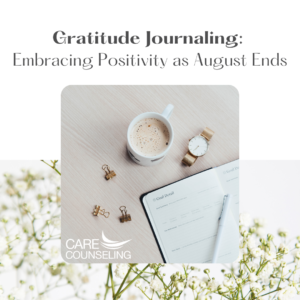Gratitude Journaling
 As August winds down, it presents a golden opportunity to reflect on the passing summer months and prepare for the fall season ahead. Amid the transitions and changes, one practice that can anchor us to the present moment and infuse our lives with positivity is gratitude journaling. This simple yet profound act allows us to acknowledge the blessings, experiences, and lessons that have colored our days, fostering a mindset of appreciation and contentment.
As August winds down, it presents a golden opportunity to reflect on the passing summer months and prepare for the fall season ahead. Amid the transitions and changes, one practice that can anchor us to the present moment and infuse our lives with positivity is gratitude journaling. This simple yet profound act allows us to acknowledge the blessings, experiences, and lessons that have colored our days, fostering a mindset of appreciation and contentment.
The Power of Gratitude
Gratitude is more than just saying “thank you.” It’s a state of being that involves recognizing and valuing the positive aspects of our lives, both big and small. The practice of gratitude has been studied extensively and has been linked to various benefits for mental and emotional well-being. From reducing stress and improving sleep to boosting overall happiness and enhancing relationships, the effects of gratitude ripple through every facet of our lives.
Embracing Positivity Through Gratitude Journaling
Gratitude journaling offers a structured way to cultivate a grateful mindset and create a lasting record of the things that bring joy and fulfillment. Here’s how you can embrace positivity as August ends through the practice of gratitude journaling:
- Reflect on Summer Highlights
As summer draws to a close, set aside time to reflect on the experiences that have enriched your life over the past months. Consider moments of connection, accomplishments, laughter, and growth. Did you embark on a memorable adventure, strengthen a relationship, or achieve a personal goal? Acknowledge these highlights as sources of gratitude.
- Capture the Small Joys
Often, it’s the small, everyday moments that hold the most beauty. Whether it’s the warmth of the sun on your skin, the aroma of freshly brewed coffee, or a heartfelt conversation with a friend, these moments contribute to the richness of life. Record these small joys in your gratitude journal to remind yourself of the simple pleasures that surround you.
- Find Silver Linings in Challenges
Challenges and setbacks are a natural part of life, but they can also be opportunities for growth and learning. Reflect on the obstacles you faced during the summer and consider the lessons they brought. Embracing gratitude doesn’t mean ignoring difficulties; rather, it involves finding silver linings even in challenging situations.
- Express Appreciation for Relationships
Our relationships with loved ones provide a foundation of support, love, and connection. Use your gratitude journal to express appreciation for the people who have enriched your life. Write about the qualities you value in each person and the positive impact they’ve had on your journey.
- Cultivate Mindfulness and Presence
Gratitude journaling encourages mindfulness, a practice of being fully present in the moment. As you write about the things, you’re grateful for, you’re attuning your awareness to the present and savoring each experience. This mindful awareness fosters a sense of presence and deepens your connection to life’s unfolding moments.
- Create a Lasting Record of Positivity
Your gratitude journal serves as a tangible reminder of the positivity that permeates your life. As you flip through its pages, you’re transported back to moments of happiness, growth, and gratitude. This practice can be particularly uplifting during challenging times, providing a source of comfort and hope.
Getting Started with Gratitude Journaling
To embark on your gratitude journaling journey, consider the following tips:
– Choose a Journal: Select a notebook or journal that resonates with you. It could be a beautifully bound book or a digital journaling app—whatever feels comfortable and inviting.
– Set a Routine: Dedicate a few minutes each day to gratitude journaling. Whether you prefer to write in the morning or before bed, consistency is key.
– Be Specific: Instead of just jotting down general statements of gratitude, delve into the details. Describe the sights, sounds, emotions, and sensations associated with each experience.
– Write Freely: Let your thoughts flow freely onto the pages. There’s no right or wrong way to express gratitude—what matters is your authentic expression.
– Celebrate Diversity: Gratitude can be found in all aspects of life, from relationships to personal achievements to the wonders of nature. Embrace the diversity of experiences that evoke gratitude within you.
As August ends, let gratitude journaling become a cherished part of your routine. By embracing positivity through the practice of gratitude, you’re inviting a spirit of appreciation and mindfulness into your life. As you write and reflect, remember that each moment of gratitude contributes to the mosaic of your journey, infusing it with vibrancy, meaning, and a deep sense of contentment.



























